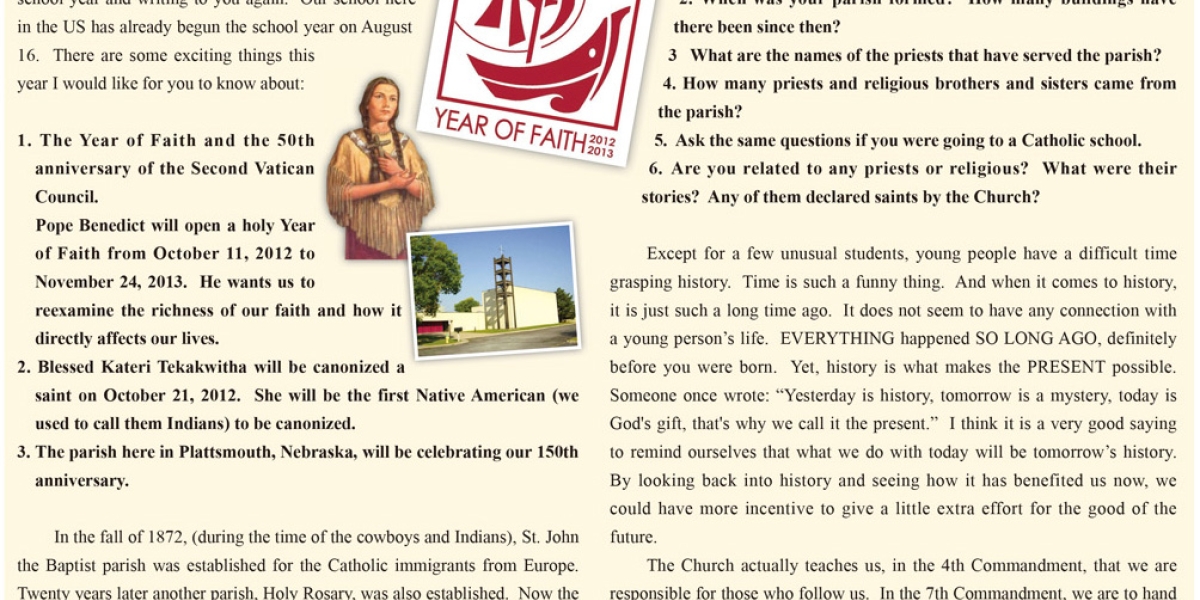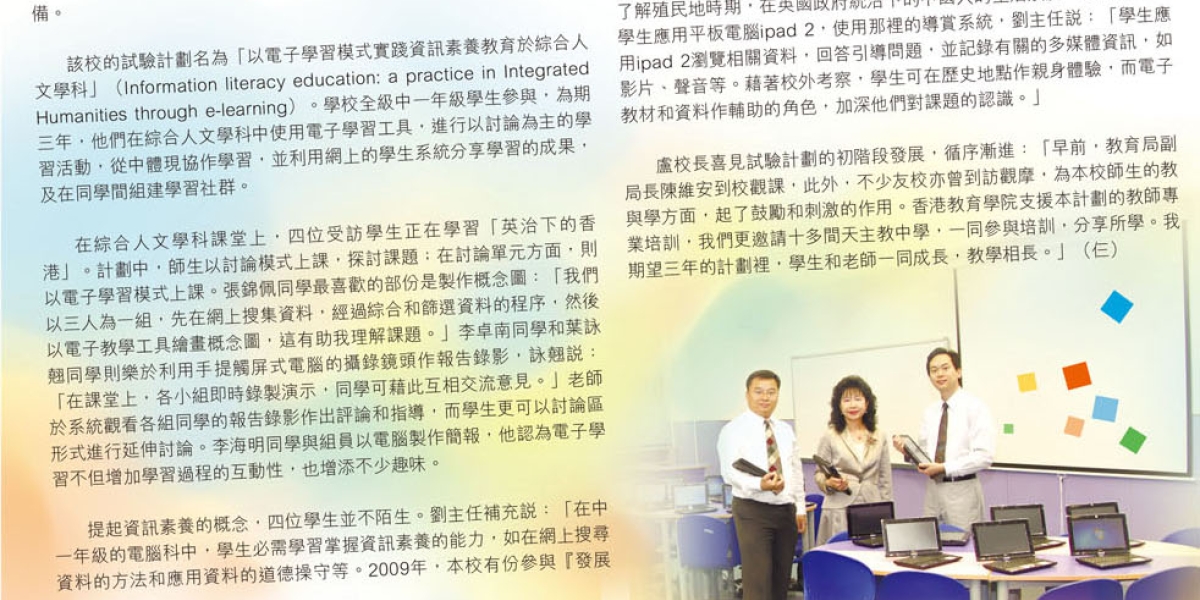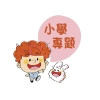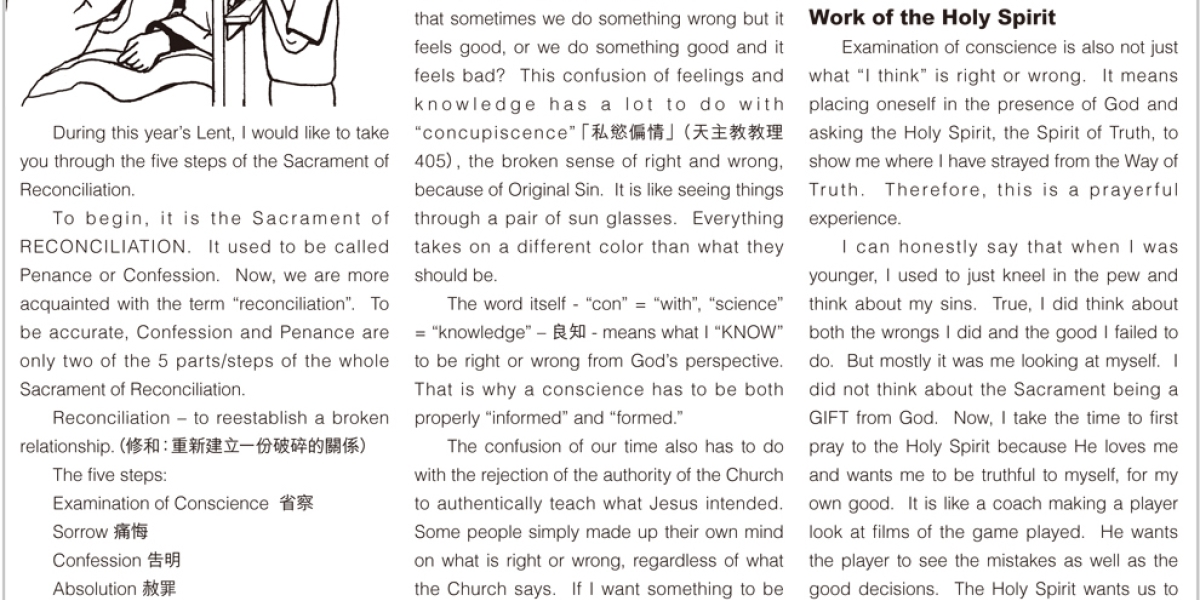昔日文章


Neither East Nor West
2012.09.14
Hello Again
Hello again. I am very excited about another new school year and writing to you again. Our school here in the US has already begun the school year on August 16. There are some exciting things this year I would like for you to know about:
1. The Year of Faith and the 50th anniversary of the Second Vatican Council.
Pope Benedict will open a holy Year of Faith from October 11, 2012 to November 24, 2013. He wants us to reexamine the richness of our faith and how it directly affects our lives.
2. Blessed Kateri Tekakwitha will be canonized a saint on October 21, 2012. She will be the first Native American (we used to call them Indians) to be canonized.
3. The parish here in Plattsmouth, Nebraska, will be celebrating our 150th anniversary.
In the fall of 1872, (during the time of the cowboys and Indians), St. John the Baptist parish was established for the Catholic immigrants from Europe. Twenty years later another parish, Holy Rosary, was also established. Now the two parishes have been combined to form the current Holy Spirit parish.
Each, in its own way, affects people’s lives. It is important that we take time to look back at how God has worked in the lives of people who lived before us and how we have been enriched because of them.In the course of this year I will write about these events. It would be wonderful if you can be a part of the journey. With that in mind, I suggest that you take some time to gather some information about your own history. You may even want to put together an album with pictures, if you could find them.
1. How many generations of Catholics are there in your family?
2. When was your parish formed? How many buildings have there been since then?
3 What are the names of the priests that have served the parish?
4. How many priests and religious brothers and sisters came from the parish?
5. Ask the same questions if you were going to a Catholic school.
6. Are you related to any priests or religious? What were their stories? Any of them declared saints by the Church?
Except for a few unusual students, young people have a difficult time grasping history. Time is such a funny thing. And when it comes to history, it is just such a long time ago. It does not seem to have any connection with a young person’s life. EVERYTHING happened SO LONG AGO, definitely before you were born. Yet, history is what makes the PRESENT possible. Someone once wrote: “Yesterday is history, tomorrow is a mystery, today is God's gift, that's why we call it the present.” I think it is a very good saying to remind ourselves that what we do with today will be tomorrow’s history. By looking back into history and seeing how it has benefited us now, we could have more incentive to give a little extra effort for the good of the future.
The Church actually teaches us, in the 4th Commandment, that we are responsible for those who follow us. In the 7th Commandment, we are to hand on to those who follow, what is given to our care. It is in this same vein, that we should look at the legacy of our faith. It is not just a gift for ourselves so that we can get to Heaven. We also have a responsibility to pass on the faith. This is what it means to evangelize, to share the Good News of Jesus.


小學專題
2012.05.06
聲影情意交流融會 學校電子學習試驗計劃 中小學分享初階段成果 2
荔景天中 教學相長 實踐資訊素養
四月下旬,盧詠琴校長偕電腦科主任/資訊科技教育主任劉家倫和四位中一學生,接受本報訪問,分享試驗計劃的初步成果,及應用資訊科技於學與教方面的經驗。盧校長表示:「本校於2008年獲選為香港教育局的資訊科技教育卓越中心(Centre of Excellence),與其他學校分享資訊科技教育經驗。當時,劉家倫主任曾半職借調到教育局工作。我看到青少年都喜歡接觸電子產品,適當地運用電子教材媒體,有助提高學生的學習動機。」試驗計劃中,該校與香港教育學院合作,通過將資訊素養結合綜合人文學科的學習,提升學生資訊素養的素質,為學生日後修讀新高中的通識科時,作更好的準備。
該校的試驗計劃名為「以電子學習模式實踐資訊素養教育於綜合人文學科」(Information literacy education: a practice in Integrated Humanities through e-learning)。學校全級中一年級學生參與,為期三年,他們在綜合人文學科中使用電子學習工具,進行以討論為主的學習活動,從中體現協作學習,並利用網上的學生系統分享學習的成果,及在同學間組建學習社群。
在綜合人文學科課堂上,四位受訪學生正在學習「英治下的香港」。計劃中,師生以討論模式上課,探討課題;在討論單元方面,則以電子學習模式上課。張錦佩同學最喜歡的部份是製作概念圖:「我們以三人為一組,先在網上搜集資料,經過綜合和篩選資料的程序,然後以電子教學工具繪畫概念圖,這有助我理解課題。」李卓南同學和葉詠翹同學則樂於利用手提觸屏式電腦的攝錄鏡頭作報告錄影,詠翹說:「在課堂上,各小組即時錄製演示,同學可藉此互相交流意見。」老師於系統觀看各組同學的報告錄影作出評論和指導,而學生更可以討論區形式進行延伸討論。李海明同學與組員以電腦製作簡報,他認為電子學習不但增加學習過程的互動性,也增添不少趣味。
提起資訊素養的概念,四位學生並不陌生。劉主任補充說:「在中一年級的電腦科中,學生必需學習掌握資訊素養的能力,如在網上搜尋資料的方法和應用資料的道德操守等。2009年,本校有份參與『發展課堂活動及評估工具通過科學科/常識科提昇學生資訊素養』研究計劃,這是教育局委託香港大學教育應用資訊科技發展研究中心(CITE)進行為期一年的研究計劃。這次經驗十分難得!」卓南和錦佩齊聲表示,透過試驗計劃,實踐他們所學的資訊素養的概念,卓南以認真的語氣跟記者說:「我們不能盡信網上所得的資訊,必須細心分析資料,這樣的訓練有助增加我們的批判性思考能力。」
該校於五月初,為中一學生舉行綜合人文學科校外考察,地點是位於港島中區的聖公會聖約翰座堂,讓學生透過參觀歷史建築物,探討和了解殖民地時期,在英國政府統治下的中國人的生活狀況。參加活動的學生應用平板電腦ipad 2,使用那裡的導賞系統,劉主任說:「學生應用ipad 2瀏覽相關資料,回答引導問題,並記錄有關的多媒體資訊,如影片、聲音等。藉著校外考察,學生可在歷史地點作親身體驗,而電子教材和資料作輔助的角色,加深他們對課題的認識。」
盧校長喜見試驗計劃的初階段發展,循序漸進:「早前,教育局副局長陳維安到校觀課,此外,不少友校亦曾到訪觀摩,為本校師生的教與學方面,起了鼓勵和刺激的作用。香港教育學院支援本計劃的教師專業培訓,我們更邀請十多間天主教中學,一同參與培訓,分享所學。我期望三年的計劃裡,學生和老師一同成長,教學相長。」(仨)
二十一世紀是一個資訊化的社會,各國許多教育機構紛紛指出資訊素養是二十一世紀必須具備的能力(Andretta, 2005; Breivik & Senn, 1998; Eisenberg, Lowe & Spitzer, 2004; Partnership 21st century skills, 2003)。資訊素養中所謂的「資訊」並不只限於電腦資訊,而是廣泛地包括了圖書、圖像、電腦及多媒體等各種的資訊來源。而素養亦並不單指是技術操作方面,而是包括分析、整理、判斷、創新、溝通和評估及使用操守。
聯合國教科文組織將資訊素養定義為個人必須能夠識別所需的信息,知道如何找尋、評估信息的質量,存儲和檢索信息,進行有效地和道德地使用信息和應用信息,以達至創造和交流知識( UNESCO, 2008 )。
(資料來源:「發展課堂活動及評估工具通過科學科/常識科提昇學生資訊素養」研究計劃)


Neither East Nor West
2012.02.26
Sacrament of Reconciliation | 修和聖事
During this year’s Lent, I would like to take you through the five steps of the Sacrament of Reconciliation.
To begin, it is the Sacrament of RECONCILIATION. It used to be called Penance or Confession. Now, we are more acquainted with the term “reconciliation”. To be accurate, Confession and Penance are only two of the 5 parts/steps of the whole Sacrament of Reconciliation.
Reconciliation – to reestablish a broken relationship.(修和:重新建立一份破碎的關係)
The five steps:
Examination of Conscience 省察
Sorrow 痛悔
Confession 告明
Absolution 赦罪
Penance 補贖
This week I will focus only on Examination of Conscience.
It is important to first look at the word conscience.
Conscience 良心(或良知)
Too often, the word conscience is used to mean how I “feel” about something. If I feel something is wrong then I have done something wrong. Is that really true? Why is it that sometimes we do something wrong but it feels good, or we do something good and it feels bad? This confusion of feelings and knowledge has a lot to do with “concupiscence”「私慾偏情」(天主教教理 405), the broken sense of right and wrong, because of Original Sin. It is like seeing things through a pair of sun glasses. Everything takes on a different color than what they should be.
The word itself - “con” = “with”, “science” = “knowledge” – 良知 - means what I “KNOW” to be right or wrong from God’s perspective. That is why a conscience has to be both properly “informed” and “formed.”
The confusion of our time also has to do with the rejection of the authority of the Church to authentically teach what Jesus intended. Some people simply made up their own mind on what is right or wrong, regardless of what the Church says. If I want something to be right, I just decide that it is right for me. They say history has shown that the Church has made many mistakes, therefore, why is the Church trying to tell me what to do?
In other words, we have decided that we are the only ones responsible for what is TRUTH! Sadly, many people think this way, and that is why so many no longer go to Confession.
Work of the Holy Spirit
Examination of conscience is also not just what “I think” is right or wrong. It means placing oneself in the presence of God and asking the Holy Spirit, the Spirit of Truth, to show me where I have strayed from the Way of Truth. Therefore, this is a prayerful experience.
I can honestly say that when I was younger, I used to just kneel in the pew and think about my sins. True, I did think about both the wrongs I did and the good I failed to do. But mostly it was me looking at myself. I did not think about the Sacrament being a GIFT from God. Now, I take the time to first pray to the Holy Spirit because He loves me and wants me to be truthful to myself, for my own good. It is like a coach making a player look at films of the game played. He wants the player to see the mistakes as well as the good decisions. The Holy Spirit wants us to see the mistakes we need to correct, guide us in making better decisions so we continue to grow, all for our own enjoyment of life.
Have a blessed Lent!



